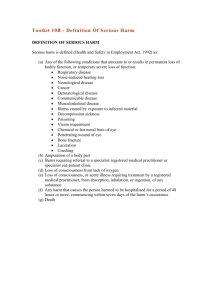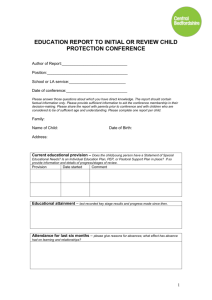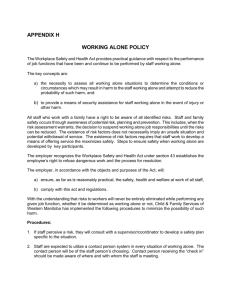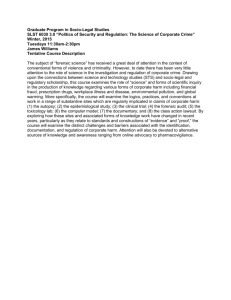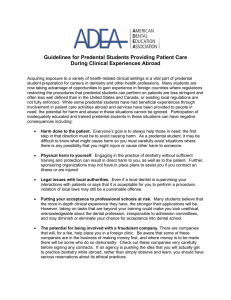Guidelines for Premedical and Medical Students Providing Patient Care
advertisement
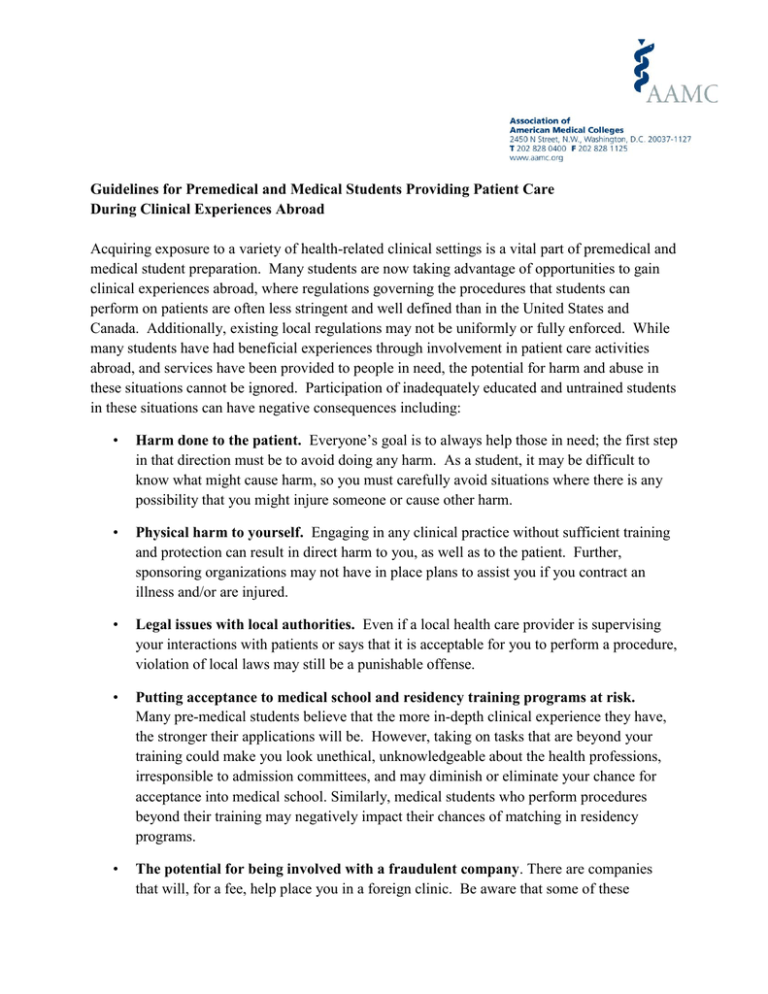
Guidelines for Premedical and Medical Students Providing Patient Care During Clinical Experiences Abroad Acquiring exposure to a variety of health-related clinical settings is a vital part of premedical and medical student preparation. Many students are now taking advantage of opportunities to gain clinical experiences abroad, where regulations governing the procedures that students can perform on patients are often less stringent and well defined than in the United States and Canada. Additionally, existing local regulations may not be uniformly or fully enforced. While many students have had beneficial experiences through involvement in patient care activities abroad, and services have been provided to people in need, the potential for harm and abuse in these situations cannot be ignored. Participation of inadequately educated and untrained students in these situations can have negative consequences including: • Harm done to the patient. Everyone’s goal is to always help those in need; the first step in that direction must be to avoid doing any harm. As a student, it may be difficult to know what might cause harm, so you must carefully avoid situations where there is any possibility that you might injure someone or cause other harm. • Physical harm to yourself. Engaging in any clinical practice without sufficient training and protection can result in direct harm to you, as well as to the patient. Further, sponsoring organizations may not have in place plans to assist you if you contract an illness and/or are injured. • Legal issues with local authorities. Even if a local health care provider is supervising your interactions with patients or says that it is acceptable for you to perform a procedure, violation of local laws may still be a punishable offense. • Putting acceptance to medical school and residency training programs at risk. Many pre-medical students believe that the more in-depth clinical experience they have, the stronger their applications will be. However, taking on tasks that are beyond your training could make you look unethical, unknowledgeable about the health professions, irresponsible to admission committees, and may diminish or eliminate your chance for acceptance into medical school. Similarly, medical students who perform procedures beyond their training may negatively impact their chances of matching in residency programs. • The potential for being involved with a fraudulent company. There are companies that will, for a fee, help place you in a foreign clinic. Be aware that some of these companies are in the business of making money first, and they may not be ethically sound. Check out these companies very carefully before signing any contracts. If any agency is over-promising and suggests that you will actually practice medicine while abroad, rather than simply observe or shadow, you should have serious reservations about working with this agency. Premedical and Medical students considering participating in an international medical service experience should review the following: • The primary purpose of a student clinical experience is observation, not hands-on treatment. You are there to learn, not to treat. • Always keep the welfare of the patient foremost in your mind, not the perceived opportunity for proving yourself. Ask yourself how you would feel if you were in the place of a patient and a person with limited skills and preparation was about to perform a procedure on you. If this thought makes you feel uncomfortable, it is probably not an appropriate task for you to be doing. Recognizing patient autonomy is one of the core values of medical ethics; it is particularly important to honor in communities with limited resources, where all patients must be given the choice whether or not to have trainees involved in their care. • Every act of service involves the building of a cultural bridge. Students should bring knowledge of the history and culture of the community they will serve, respect for cultural differences, a listening and learning attitude, and behaviors that will enable ethical and effective service. Health care professionals in the country being served will likely have a deep understanding of local health care issues, resources and challenges. Be sensitive to the concerns of the local health care team and seek to understand the perspective of the patients you are serving. • It is appropriate for students to provide preventive health education and to support the health care team by assisting in the provision of health treatment after receiving adequate instruction. However, students should never engage in any unsupervised activity that is considered the practice of medicine including, but not limited to: diagnosing diseases, administering narcotics, performing surgical procedures, suturing or other tasks generally reserved for the trained health professional. • There will always be disparities in what individual students are prepared and trained to do. Some students (e.g., those with previous EMT training) will be better prepared to take on more advanced patient care than others. However, just because a peer has been able to successfully perform a particular task does not mean that you are also ready to undertake the same task. Understand and perform within your limitations. • Students should be aware that it is not necessary to travel abroad to serve those in need. There are many opportunities to help the disadvantaged and other underserved groups in the U.S. There are likely worthwhile volunteer opportunities in your own community, with many more around the country. Also, be mindful that while appropriate experience in other countries can be valuable and may be viewed as complementary, if you plan to practice in the U.S, it is particularly important to understand U.S. healthcare. Approved by the AAMC GSA Steering Committee on February 25, 2011 Adapted with permission from policies developed at: Hendrix College, Conway, AR by Mark Sutherland, Ph.D., Professor of Biology; Stanford University’s Haas Center for Public Service (http://studentaffairs.stanford.edu/haas/principles/document), and the American Dental Education Association.

